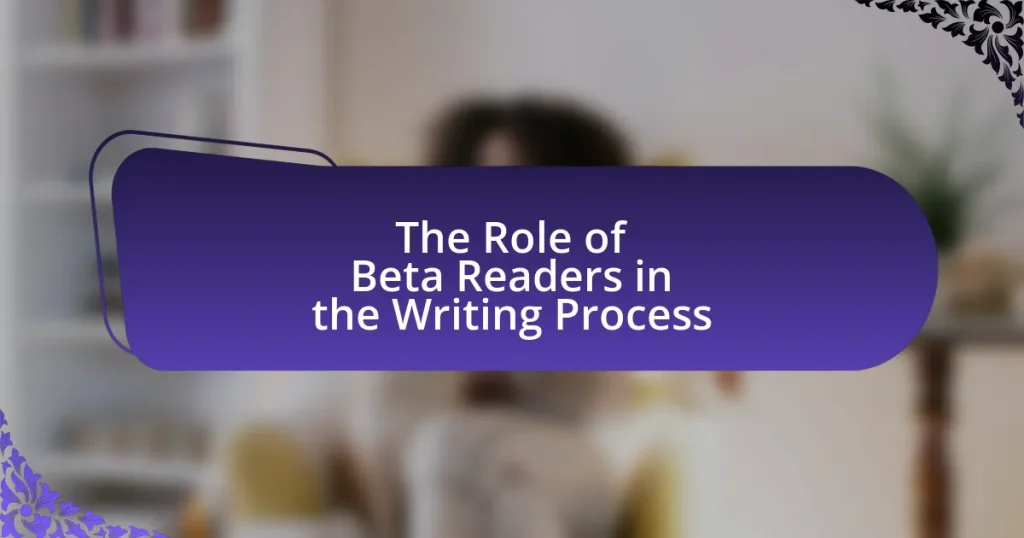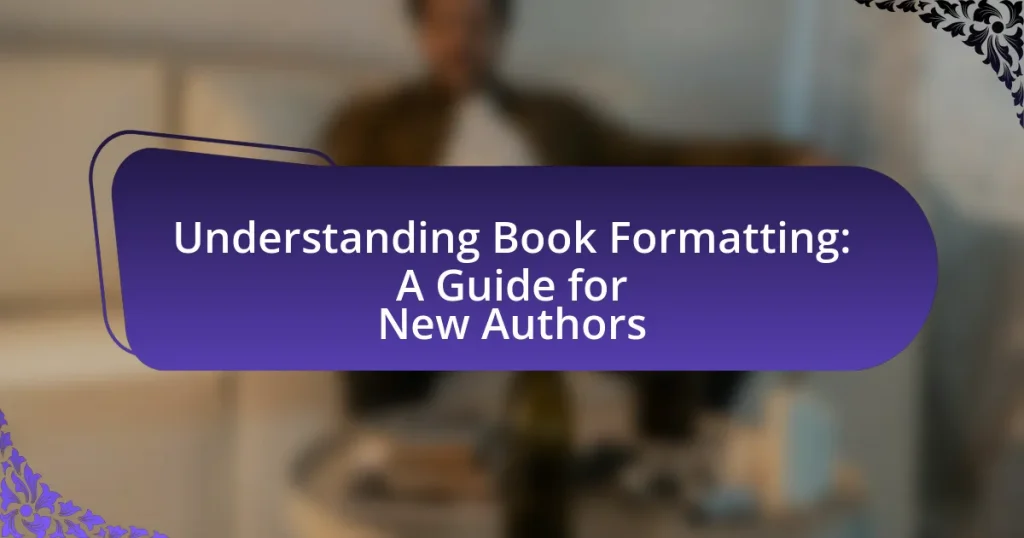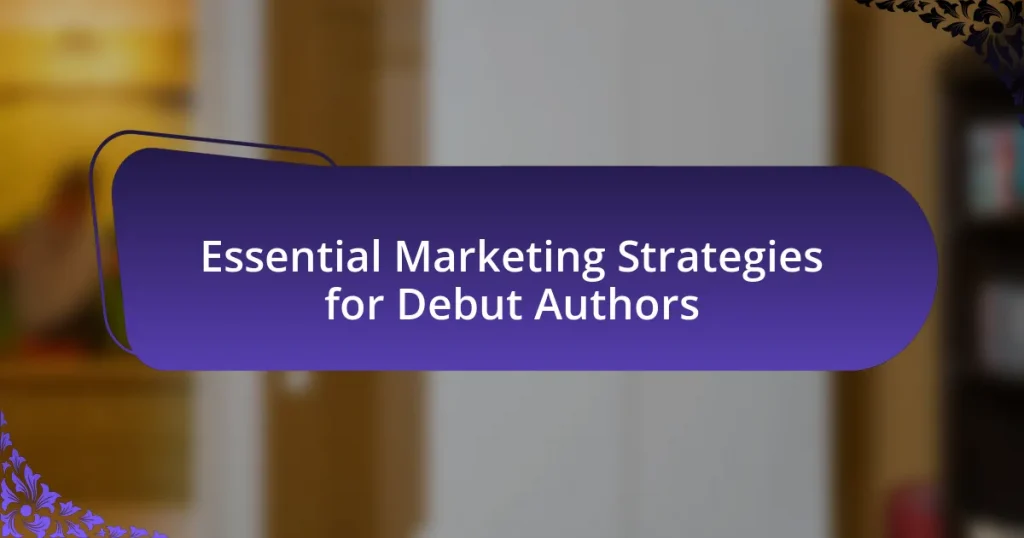A query letter to literary agents is a formal document that authors use to pitch their manuscripts, including a synopsis, author information, genre, and word count. This letter is crucial in the publishing process as it serves as the first point of contact between authors and agents, significantly impacting the chances of securing representation. Key components of an effective query letter include a compelling hook, a concise synopsis, and relevant author credentials, while common mistakes to avoid involve lack of personalization and verbosity. Authors can enhance their query letters through research, feedback, and adherence to best practices, ultimately increasing their likelihood of attracting literary agents and achieving publication.

What is a Query Letter to Literary Agents?
A query letter to literary agents is a formal communication that authors use to pitch their manuscript to potential agents. This letter typically includes a brief synopsis of the book, information about the author, and the genre and word count of the manuscript. The purpose of the query letter is to entice the agent to request the full manuscript for further consideration, making it a crucial step in the publishing process. According to the Association of Authors’ Representatives, a well-crafted query letter can significantly increase an author’s chances of securing representation.
Why is a Query Letter Important in the Publishing Process?
A query letter is important in the publishing process because it serves as the initial point of contact between an author and a literary agent or publisher. This letter succinctly presents the author’s manuscript, including its premise, genre, and target audience, which helps agents assess the work’s marketability. According to the Association of Authors’ Representatives, a well-crafted query letter can significantly increase an author’s chances of receiving representation, as it demonstrates professionalism and the author’s ability to communicate effectively. Thus, the query letter is a critical tool in securing interest and advancing an author’s publishing career.
What role does a Query Letter play in attracting literary agents?
A Query Letter serves as a critical tool in attracting literary agents by providing a concise introduction to an author’s work and establishing their professionalism. This letter outlines the book’s premise, genre, and target audience, while also showcasing the author’s writing style and credentials. A well-crafted Query Letter can capture an agent’s interest, leading to requests for full manuscripts. According to the Association of Authors’ Representatives, a compelling Query Letter is often the first step in securing representation, as agents receive numerous submissions and rely on these letters to quickly assess potential projects.
How does a Query Letter impact an author’s chances of getting published?
A query letter significantly impacts an author’s chances of getting published by serving as the first point of contact with literary agents and publishers. This letter must effectively convey the book’s premise, the author’s credentials, and the target audience to capture the agent’s interest. According to a survey by the Association of Authors’ Representatives, 80% of agents reported that a well-crafted query letter is crucial in determining whether they request a manuscript. Therefore, a compelling query letter can increase the likelihood of securing representation and ultimately lead to publication.
What are the Key Components of an Effective Query Letter?
An effective query letter includes several key components: a compelling hook, a concise summary of the manuscript, author credentials, and a professional closing. The hook captures the agent’s attention immediately, often presenting the main conflict or unique aspect of the story. The summary provides a brief overview of the plot, highlighting the main characters and their goals, while maintaining clarity and intrigue. Author credentials establish the writer’s qualifications, such as previous publications or relevant experience, which can enhance credibility. Finally, a professional closing thanks the agent for their time and includes contact information. These components are essential for engaging literary agents and increasing the chances of a positive response.
What should be included in the opening paragraph of a Query Letter?
The opening paragraph of a query letter should include a concise hook that captures the essence of the manuscript, along with the title, genre, and word count. This introduction serves to engage the literary agent’s interest immediately. For instance, stating the title and genre provides context, while a compelling hook summarizes the main conflict or theme, making it clear why the story is unique and worth considering. This approach aligns with industry standards, as agents often look for a strong opening to gauge the potential of the work.
How should an author present their book’s synopsis in a Query Letter?
An author should present their book’s synopsis in a query letter by clearly summarizing the main plot, characters, and themes in a concise manner, typically within 250-300 words. This synopsis should capture the essence of the story, highlighting the protagonist’s journey, the central conflict, and the stakes involved. For instance, a well-structured synopsis often begins with a hook that draws the reader in, followed by a brief overview of the main character’s goals and challenges, and concludes with a hint of the resolution or climax. This approach ensures that literary agents can quickly grasp the story’s appeal and potential marketability, which is crucial given that agents receive numerous submissions daily.
What credentials or background information should be mentioned?
When crafting an effective query letter to literary agents, it is essential to mention relevant credentials and background information that establish your authority as a writer. This includes your previous publications, writing awards, educational background in creative writing or literature, and any professional affiliations with writing organizations. For instance, if you have been published in reputable literary magazines or have won awards such as the Pushcart Prize, these details enhance your credibility. Additionally, mentioning participation in writing workshops or conferences can demonstrate your commitment to the craft. Such credentials provide agents with confidence in your abilities and the potential marketability of your work.
What Common Mistakes Should Be Avoided in a Query Letter?
Common mistakes to avoid in a query letter include failing to personalize the letter, which can make it seem generic and unprofessional. Personalization demonstrates that the writer has researched the agent and understands their preferences, increasing the chances of a positive response. Another mistake is exceeding the word count or not adhering to submission guidelines, as agents often specify limits for queries. Ignoring these guidelines can lead to immediate rejection. Additionally, writers should avoid using overly formal or flowery language; clarity and conciseness are more effective in conveying the story’s essence. Lastly, neglecting to proofread for grammatical errors and typos can undermine the writer’s credibility, as agents expect polished submissions.
How can an author ensure their Query Letter is free of grammatical errors?
An author can ensure their Query Letter is free of grammatical errors by thoroughly proofreading the document before submission. This process includes reading the letter multiple times, focusing on different aspects such as sentence structure, punctuation, and word choice during each read-through. Utilizing grammar-checking software, such as Grammarly or ProWritingAid, can also help identify and correct errors that may be overlooked. Additionally, seeking feedback from peers or professional editors can provide an external perspective, further reducing the likelihood of grammatical mistakes. Research indicates that well-edited documents significantly enhance the author’s credibility and increase the chances of a positive response from literary agents.
What are the pitfalls of being overly verbose in a Query Letter?
Being overly verbose in a query letter can lead to several pitfalls, primarily causing agents to lose interest and overlook key information. Excessive wordiness can obscure the main message, making it difficult for agents to grasp the essence of the story or the author’s qualifications. This lack of clarity can result in the query being dismissed, as agents typically prefer concise and engaging pitches that quickly convey the book’s premise and the author’s credentials. Furthermore, verbosity can signal a lack of respect for the agent’s time, which may negatively impact the author’s reputation in the industry. Studies show that agents receive hundreds of queries daily, and those that are succinct and to the point are more likely to capture attention and receive a favorable response.
How Can Authors Tailor Their Query Letters to Specific Agents?
Authors can tailor their query letters to specific agents by researching each agent’s preferences, interests, and submission guidelines. This involves reviewing the agent’s website, social media, and recent sales to understand the genres they represent and the types of projects they are currently seeking. By aligning the query letter’s content with the agent’s specific interests, authors can demonstrate their understanding of the agent’s portfolio and increase the likelihood of a positive response. For instance, if an agent specializes in contemporary romance, the author should emphasize elements of romance in their query, showcasing how their work fits within the agent’s established niche.
What research should authors conduct before addressing a Query Letter?
Authors should conduct research on literary agents to tailor their query letters effectively. This includes identifying agents who represent their genre, understanding their submission guidelines, and reviewing their recent sales and client lists. For instance, the Association of Authors’ Representatives provides a directory of agents, while websites like QueryTracker offer insights into agents’ preferences and response times. Additionally, authors should analyze successful query letters in their genre to understand effective strategies and common elements. This targeted research increases the likelihood of capturing an agent’s interest and aligns the author’s work with the agent’s portfolio.
How can an author personalize their Query Letter for different agents?
An author can personalize their query letter for different agents by researching each agent’s preferences and interests, then tailoring the content accordingly. This involves addressing the agent by name, mentioning specific works they have represented that align with the author’s manuscript, and reflecting the agent’s stated submission guidelines. For example, if an agent specializes in contemporary romance, the author should highlight elements of their story that resonate with that genre. Personalization increases the likelihood of capturing the agent’s attention, as agents often receive numerous queries and are more inclined to respond positively to those that demonstrate a clear understanding of their tastes and requirements.

What Strategies Can Enhance the Effectiveness of a Query Letter?
To enhance the effectiveness of a query letter, writers should focus on personalization, clarity, and professionalism. Personalizing the query letter by addressing the agent by name and referencing their specific interests or previous works demonstrates research and genuine interest, which can significantly increase engagement. Clarity is essential; the letter should succinctly convey the book’s premise, genre, and target audience in a compelling manner, ideally within the first few sentences. Professionalism in formatting, grammar, and tone reflects the writer’s seriousness and respect for the agent’s time. According to a study by the Association of Authors’ Representatives, personalized queries have a higher response rate, indicating that tailored communication is more effective in the literary industry.
How can authors create a compelling hook in their Query Letter?
Authors can create a compelling hook in their query letter by starting with a strong, intriguing statement that encapsulates the essence of their story. This statement should highlight the unique premise or conflict of the narrative, immediately capturing the agent’s attention. For example, a hook might present a high-stakes situation or a character facing an extraordinary challenge, which invites curiosity about the outcome. Research indicates that hooks that evoke emotion or present a relatable dilemma are particularly effective in engaging readers, as they create an immediate connection to the story’s stakes and themes.
What techniques can be used to grab an agent’s attention in the first sentence?
To grab an agent’s attention in the first sentence, use a compelling hook that presents a unique premise or an intriguing conflict. This technique effectively engages the reader by immediately showcasing the story’s originality or emotional stakes. For instance, starting with a provocative question or a striking statement can create curiosity, prompting the agent to read further. Research indicates that first impressions are crucial in literary submissions, as agents often make quick judgments based on initial lines, reinforcing the importance of a strong opening.
How important is the tone and style of writing in a Query Letter?
The tone and style of writing in a query letter are critically important as they directly influence the agent’s perception of the manuscript and the author. A professional and engaging tone can capture the agent’s interest, while a poorly executed style may lead to immediate rejection. Research indicates that agents often look for a voice that reflects the author’s unique perspective, which can be conveyed through careful word choice and sentence structure. For instance, a query letter that mirrors the genre’s conventions and showcases the author’s personality can significantly enhance the likelihood of a positive response.
What Role Does Feedback Play in Crafting a Query Letter?
Feedback is crucial in crafting a query letter as it helps refine the content, structure, and overall effectiveness of the letter. By receiving insights from peers, mentors, or industry professionals, writers can identify weaknesses, clarify their message, and enhance the appeal of their query. For instance, feedback can reveal whether the letter effectively captures the essence of the manuscript and aligns with the expectations of literary agents, which is essential for increasing the chances of a positive response.
How can critique partners or writing groups assist in refining a Query Letter?
Critique partners or writing groups can significantly assist in refining a query letter by providing constructive feedback on its content, structure, and tone. These collaborators can identify areas that may be unclear or unengaging, ensuring that the letter effectively captures the attention of literary agents. For instance, they can point out jargon or overly complex language that may detract from the letter’s clarity. Additionally, critique partners can offer insights based on their own experiences with query letters, sharing what has worked for them and what has not. This peer review process often leads to a more polished and compelling query letter, increasing the chances of a positive response from agents.
What are the benefits of seeking professional editing for a Query Letter?
Seeking professional editing for a query letter enhances its clarity, effectiveness, and overall impact. Professional editors provide expertise in language, structure, and tone, ensuring that the letter communicates the author’s intent succinctly and persuasively. This can significantly increase the chances of capturing a literary agent’s attention, as a well-edited query letter demonstrates professionalism and attention to detail. Research indicates that agents receive hundreds of submissions, making a polished query letter crucial for standing out in a competitive market.
What Resources Are Available for Writing Query Letters?
Resources available for writing query letters include books, online articles, and workshops specifically focused on literary submissions. Notable books such as “The Writer’s Guide to Query Letters” by Anne Mini and “Query Letters That Worked” by Jessica Page Morrell provide structured guidance and examples. Online platforms like Writer’s Digest and QueryTracker offer articles and templates that detail best practices for crafting effective queries. Additionally, workshops and webinars hosted by writing organizations, such as the Association of Authors’ Representatives, provide interactive learning experiences and expert feedback on query letters. These resources collectively equip writers with the knowledge and tools necessary to create compelling queries that attract literary agents.
Which books or websites provide guidance on Query Letter writing?
Books that provide guidance on query letter writing include “The Writer’s Guide to Queries, Pitches, and Proposals” by Moira Allen and “Query Letters That Worked” by the staff of Writer’s Digest. Websites such as Writer’s Digest, Query Shark, and the Association of Authors’ Representatives offer valuable resources and examples for crafting effective query letters. These sources are recognized in the writing community for their practical advice and successful query letter examples, making them reliable references for aspiring authors.
How can authors utilize workshops or webinars to improve their Query Letters?
Authors can utilize workshops or webinars to improve their query letters by gaining direct feedback from industry professionals and peers. These platforms often feature experienced agents or editors who provide insights into what makes a query letter stand out, including structure, tone, and content. Participating in these sessions allows authors to ask specific questions and receive tailored advice, which can enhance their understanding of the expectations of literary agents. Additionally, workshops and webinars frequently include exercises that encourage authors to revise their letters in real-time, fostering immediate application of learned concepts. This interactive environment not only builds confidence but also helps authors refine their writing skills based on expert guidance and peer critiques.

What Are the Next Steps After Sending a Query Letter?
After sending a query letter, the next steps involve waiting for a response from the literary agent and preparing for potential follow-up actions. Typically, agents may take several weeks to respond, so patience is essential during this period. If a response is received, it may include a request for a full manuscript, feedback, or a rejection. In the case of a request for more material, promptly sending the requested documents is crucial. If the response is a rejection, it is advisable to review the agent’s feedback, if provided, and consider submitting to other agents. According to the Association of Authors’ Representatives, agents often take 4 to 8 weeks to respond, underscoring the importance of managing expectations during this waiting period.
How should authors handle responses from literary agents?
Authors should respond to literary agents’ feedback with professionalism and gratitude. When receiving a response, whether positive or negative, authors should take time to process the information before replying. If the agent expresses interest, authors should follow up promptly with any requested materials or clarifications. In cases of rejection, authors should thank the agent for their time and consideration, and if feedback is provided, they should reflect on it to improve future submissions. This approach fosters a positive relationship and demonstrates professionalism, which can be beneficial for future interactions.
What should an author do if they receive a rejection?
An author should analyze the rejection to identify any constructive feedback provided. This feedback can guide revisions to improve the manuscript or query letter. Authors should also consider submitting to other agents or publishers, as rejection is a common part of the publishing process; for instance, J.K. Rowling faced multiple rejections before finding a publisher for Harry Potter. Additionally, authors can seek peer reviews or professional editing to enhance their work before resubmission.
How can authors follow up appropriately after sending a Query Letter?
Authors can follow up appropriately after sending a Query Letter by waiting a minimum of four to six weeks before reaching out. This timeframe allows literary agents sufficient time to review submissions, as many agents receive a high volume of queries. When following up, authors should send a polite and concise email, reiterating their interest in the project and inquiring about the status of their submission. This approach is supported by industry standards, which suggest that respectful communication fosters positive relationships between authors and agents.
What Best Practices Should Authors Follow When Crafting a Query Letter?
Authors should follow several best practices when crafting a query letter to literary agents. First, they must personalize each query by addressing the agent by name and mentioning specific reasons for targeting them, which demonstrates research and genuine interest. Additionally, authors should succinctly summarize their manuscript in a compelling hook, including the genre, word count, and a brief synopsis that highlights the main conflict and unique aspects of the story.
Moreover, authors should maintain a professional tone and format, ensuring the letter is free of grammatical errors and follows industry standards, such as single-spacing and standard fonts. Including relevant author credentials or previous publications can enhance credibility. Finally, authors should conclude with a polite closing and their contact information, making it easy for agents to respond. These practices increase the likelihood of capturing an agent’s attention and securing a request for the manuscript.
How can authors ensure their Query Letter is concise and impactful?
Authors can ensure their Query Letter is concise and impactful by focusing on clarity and brevity. This involves using straightforward language, eliminating unnecessary details, and structuring the letter to highlight the main points: a compelling hook, a brief synopsis of the work, and relevant author credentials. Research indicates that agents prefer query letters that are direct and to the point, as they receive numerous submissions and have limited time to evaluate each one. By adhering to a word count limit, typically around 250-300 words, authors can maintain focus and enhance the letter’s effectiveness.
What tips can help authors maintain professionalism in their Query Letters?
Authors can maintain professionalism in their query letters by adhering to specific guidelines. First, they should research and follow the submission guidelines provided by literary agents, as each agent may have unique requirements regarding format, length, and content. Additionally, authors must ensure their letters are free from grammatical errors and typos, as these mistakes can undermine their credibility. Using a formal tone and addressing the agent by name demonstrates respect and personalization, which can positively influence the agent’s perception. Furthermore, authors should clearly articulate their book’s premise, target audience, and their qualifications, as this clarity reflects professionalism and preparedness. Lastly, authors should keep their letters concise, ideally one page, to respect the agent’s time and maintain focus on the essential information.



